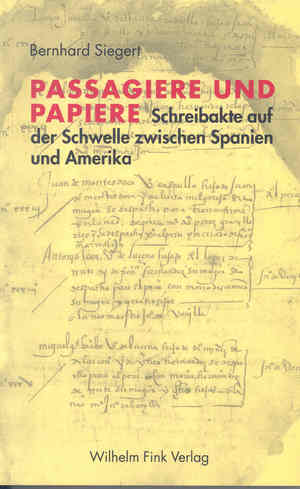Bernhard Siegert: Passagiere und Papiere: Schreibakte Auf der Schwelle Zwischen Spanien und Amerika (2006) [German]
Filed under book | Tags: · identity, media archeology, media theory, migration, writing

Passagiere und Papiere ist ein Buch über eine vergessene Urszene der Moderne. In den bürokratischen Ritualen der Narrativierung und Verschriftlichung, durch die all jene infamen Menschen in den Status von legalen Personen initiiert wurden, die an Bord eines Schiffes nach Amerika gehen wollten, wird nicht nur das moderne Untertanensubjekt erfunden, sondern wird auch die Maske zum Träger der Person und Wirklichkeit unlösbar gebunden an ihre papierene Repräsentation. Der Krieg der spanischen Krone gegen die eigene Bevölkerung im 16. Jahrhundert, gegen konvertierte Juden und Mauren, aber auch gegen Arme und Vagabunden, produziert an der Schwelle zur Neuen Welt eine immense kleine Literatur: Ausreiseanträge, Verhörsprotokolle, Zeugenaussagen, Passagierlisten. Von 1535 an durfte niemand mehr in Sevilla ein Schiff besteigen, der nicht vorher in schriftlicher Form vor einem Richter schriftliche Zeugnisse von seiner Identität, seiner Herkunft, seinem anständigen Leben, seinen Narben und Malen erbracht hatte. Das Indienhaus, die “Casa de la Contratación”, wurde so zu einem der ersten Orte in Europa, wo das Beschrieben- und Ezähltwerden aufhörte, ein Privileg der Mächtigen zu sein, und anfing, ein Mittel der Überwachung und der Kontrolle zu werden. Bernhard Siegert rekonstruiert anhand bisher kaum erforschter Quellen aus dem Archivo General de Indias in Sevilla die Rituale und Prozeduren der Legitimation, der Narrativierung, der Registrierung und der Fiktionalisierung, die all jene durchlaufen mußten, die im 16. Jahrhundert an Bord eines der Schiffe nach Amerika gehen wollten. Auf der anderen Seite des Ozeans schließlich verzahnen sich die Passagierlisten mit Einwohnerverzeichnissen und Siedlungstopographien. Das Seßhaftmachen der Passagiere bringt rasterförmige Register und registerförmige Raster ins Spiel, die das “Am-Platz-Sein” von Menschen an ein “Am-Platz-Sein” von Lettern binden.
Publisher Wilhelm Fink Verlag, Munich, 2006
ISBN 377054224X, 9783770542246
176 pages
PDF
View online (added on 2014-6-2)
Teju Cole: Open City: A Novel (2011)
Filed under fiction | Tags: · identity, memory, migration, new york, race

A haunting novel about national identity, race, liberty, loss, dislocation, and surrender, Teju Cole’s Open City seethes with intelligence. It is a profound work by an important new author who has much to say about our country and our world.
Along the streets of Manhattan, a young Nigerian doctor doing his residency wanders aimlessly, reflecting on his relationships, his recent breakup with his girlfriend, his present, his past. Though he is navigating the busy parts of town, the impression of countless faces does nothing to assuage his feelings of isolation. But it is not only a physical landscape he covers; Julius crisscrosses social territory as well, encountering people from different cultures and classes who will provide insight on his journey—which takes him to Brussels, to the Nigeria of his youth, and into the most unrecognizable facets of his own soul.
Winner of the 2012 PEN/Hemingway Award.
Publisher Random House, 2011
ISBN 0812980093, 9780812980097
259 pages
review (Boyd Tonkin, The Independent)
review (James Wood, The New Yorker)
review (Miguel Syjuco, The New York Times)
wikipedia
publisher
google books
Andreas Broeckmann, Knowbotic Research (eds.): Opaque Presence: Manual of Latent Invisibilities (2010)
Filed under book | Tags: · anonymity, art, identity, performance art, subjectivity

In the society of late capitalism – whether we understand it as a society of consumption, of control, or as a cybernetic society -, visibility and transparency are no longer signs of democratic openness, but rather of administrative availability. Spaces of agency and spaces of social friction are absorbed into the surfaces of technical processes. Even when the games of visibility, of attention, and of the mechanisms of subjectivation, may not always be a matter of bare survival, they are still a matter of maintaining and appropriating heterotopic zones in which resistance, if not freedom, can be postulated.
This book deals with questions of public visibility and strategic camouflage. It hinges on the public performance project ›macghillie – just a void‹ by the artist group knowbotic research, in which urban sites are visited by a figure, clad in a camouflage suit. The so-called ›Ghillie Suit‹ was originally invented in the 19th century for hunting and has since the First World War been used in military contexts all over the world. When worn in a contemporary public environment, its camouflage effects the anonymisation and the neutralisation of the person wearing it. The figure of the ›MacGhillie‹ oscillates between the hyperpresence of a mask, and visual redundancy. It traverses the modern urban environment in which conspicuity holds ambivalent currency, wavering between cumbersome affirmation and visual arbitrariness. In the project, the suit is made available to members of the public who can thus become macghillie for a while, testing the boundaries of subjectivity and identity.
With texts by Eva Meyer, Matthew Fuller, Andreas Broeckmann, Marcus Steinweg, knowbotic research, Tiqqun
Publisher Diaphanes, 2010
Edition Jardins des Pilotes
ISBN 3037341084, 9783037341087
156 pages

